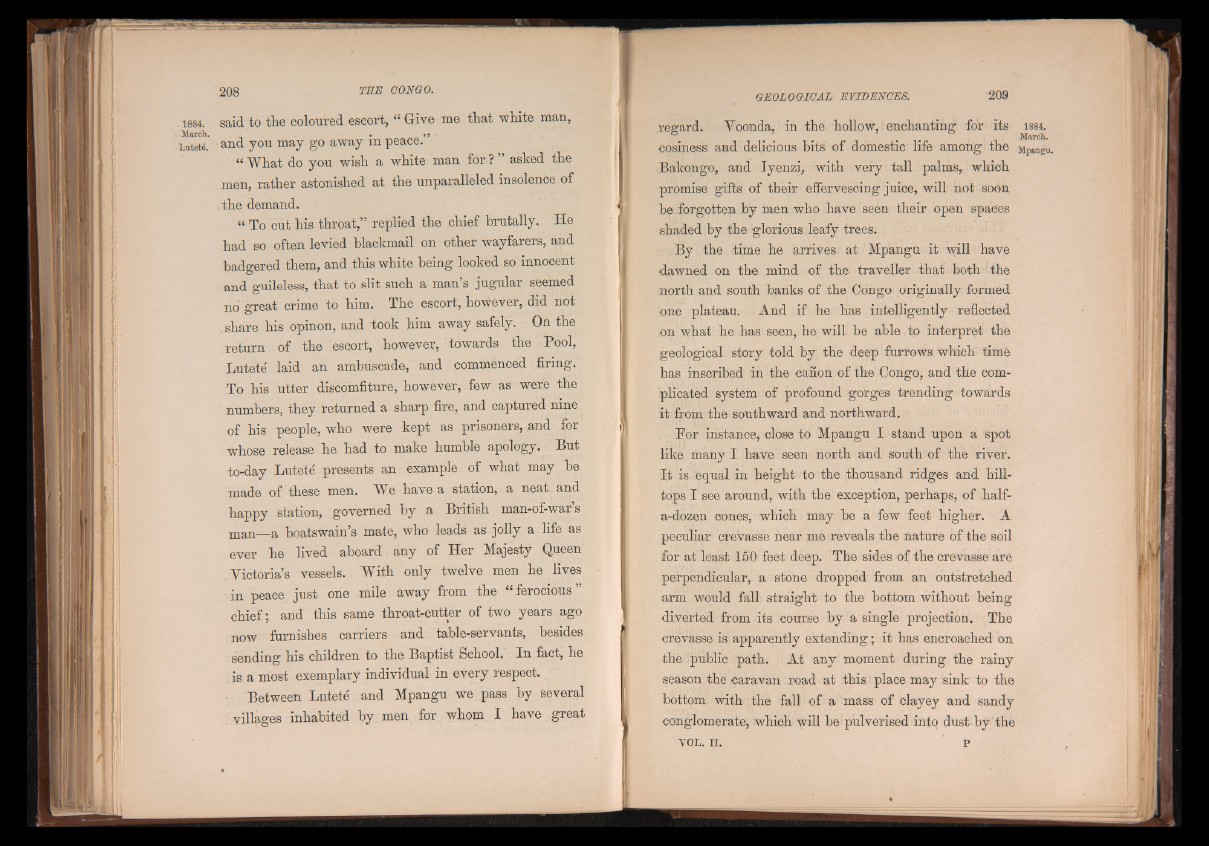
. 1884. said to the coloured escort, % Give me that white man,
■ March. . . ,j . and you may go away m peace.
“ What do you wish a white man for ? asked the
men, rather astonished at the unparalleled insolence of
, the demand.
| To cut his throat,” replied the chief brutally. He
had so often levied blackmail on other wayfarers, and
badgered them, and this white being looked so innocent
■ and guileless, that to slit such a man’s jugular seemed
no great crime to him. The escort, however, did not
, share his opinon, and took him away safely. On the
return of the escort, however, towards the Pool,
Lutete laid an ambuscade, and commenced firing.
To his utter discomfiture, however, few as were the
numbers, they returned a sharp fire, and captured nine
of his people, who were kept as prisoners, and for
whose release he had to make humble apology. But
to-day Lutete presents an example of what may he
made of these men. We have a station, a neat and
happy station, governed by a British man-of-war’s
man—a boatswain’s mate, who leads as jolly a life as
ever he lived aboard any of Her Majesty Queen
. Yictoria’s vessels. With only twelve men he lives
in peace just one mile away from the “ ferocious”
chief; and this same throat-cutter of two years ago
now furnishes carriers and table-servants, besides
sending his children to the Baptist School. In fact, he
is a most exemplary individual in every respect.'
Between Lutete and Mpangu we pass by several
villages inhabited by men for. whom I have great
regard. Yoonda, in the hollow, enchanting for its 1884.
i March.
cosiness and delicious bits of domestic life among the Mpangu.
Bakongo, and Iyenzi, with very tall palms, which
promise gifts of their effervescing juice, will not soon
be forgotten by men who have seen their open spaces
shaded by the glorious leafy trees.
By the time he arrives at Mpangti it will have
dawned on the mind of the traveller that both the
north and south banks of the Congo originally formed
one plateau. And if he has intelligently reflected
on what he has seen, he will be able to interpret the
geological story told by the deep furrows which timé
has inscribed in the canon of the Congo, and the complicated
system of profound gorges trending towards
it from the southward and northward.
For instance, close to Mpangu I stand upon a spot
like many I have seen north and south of the river.
It is equal in height to the thousand ridges and hilltops
I see around, with the exception, perhaps, of half-
a-dozen cones, which may be a few feet higher. A
peculiar crevasse near me reveals the nature of the soil
for at least 150 feet deep. The sides of the crevasse are
perpendicular, a stone dropped from an outstretched
arm would fall straight to the bottom without being
diverted from its course by a single projection. The
crevasse is apparently extending; it has encroached on
the public path. At any moment during the rainy
season the caravan road at this place may sink to the
bottom with the fall of a mass of clayey and sandy
conglomerate, which will be pulverised into dust by the
VOL. II. p